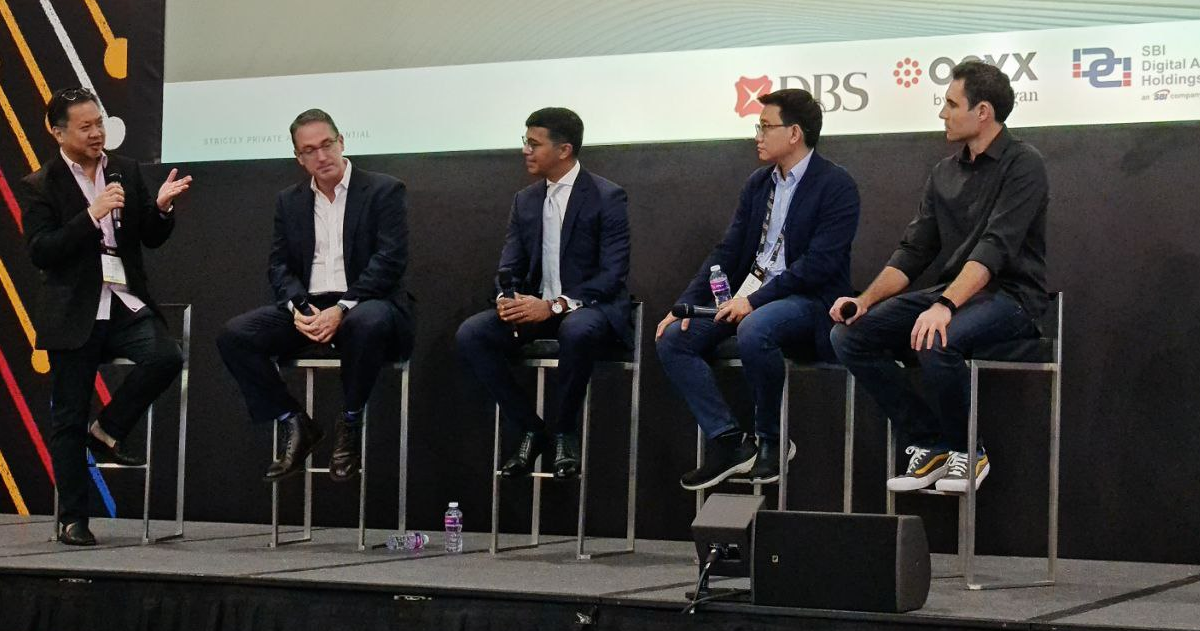In June, the Monetary Authority of Singapore (MAS) announced the commencement of Project Guardian, a collaborative initiative with partners within the financial industry to explore the potential and value of asset tokenisation.
After four months of testing, the results were finally unveiled earlier this month at the Singapore Fintech Festival (SFF) 2022.
Following an initial announcement by DBS that Project Guardian had successfully tested the trading of government securities and foreign exchange using DeFi tools, representatives of the involved companies were on site at SFF 2022 to showcase the fruits of their research.
These included Tyrone Lobban, Head of Blockchain and Onyx Digital Assets at Onyx by J.P.Morgan, Jason Beale, Head of Product at SBI Digital Asset Holdings, and Keith Desouza, Managing Director for Treasury and Markets and Treasury Liquidity Management at DBS.
What’s wrong with the status quo?
The financial market, according to the panellists, has many issues that need fixing. Primarily, there are issues of high friction within the traditional financial market.
According to Keith, the execution of a trade within traditional financial markets is slow and cumbersome.

Once a trader executes a trade, securities and cash need to go through about three or four different steps before they reach their final destination. For the repo market, we’re talking about five or six different steps, and we have different back offices involved.
– Keith Desouza, Managing Director, Treasury and Markets and Treasury Liquidity Management, DBS
There are also operational issues, and different time zones will make the problem worse since securities clearing does not happen at the same time everywhere.
All of these issues have to be bilaterally negotiated as well, since there isn’t a single overarching document that everybody signs off on.
Since there are many parties involved within a single trade, it also opens traders up to greater risk and complexity — different service providers will provide different prices, which can lead to significant price deviations within the same day, and traders are exposed to greater risk since their securities and cash pass between multiple hands.
These issues result in significant friction within the markets, and thus far, the banking sector has failed to address them adequately without blockchain technology.
Why DeFi?
The issues that traditional finance has been unable to solve, however, can be solved through the use of DeFi tools on the blockchain — and this is what Project Guardian has set out to test.
The most obvious benefit is the ability to substitute the work of traditional finance institutions with smart contracts, which will carry out the trading and legwork in their stead.

At the same time, innovations such as trust anchors mean that even spaces like DeFi can be regulated properly.
What we are trying to achieve through Project Guardian is to create a DeFi protocol and merge it with trad-fi principles such as Know-Your-Customer (KYC) obligations and Anti-Money Laundering (AML) measures. Once we align it with regulatory expectations and reporting requirements, then we have something like an institutional DeFi product.
– Jason Beale, Head of Product, SBI Digital Asset Holdings
In this case, trust anchors will be used to issue trading credentials to traders, who must then provide these credentials alongside their orders for trades in order for the trade to be carried out.
The credentials are then verified on chain, and clearance can be instantaneous. To test this, the panellists demonstrated scenarios where valid credentials were used, as well as a scenario where a trade order was denied because of invalid credentials.
The future of finance
While Project Guardian has already yielded results, the panelists have also promised that this is not the end. There will be more developments as the Project Guardian continues to research asset tokenisation and DeFi tools.
We want Guardian to be integrative, use existing KYC processes, we want it to be scalable, we want to have the ability to work with every DeFi protocol, and we want traders to easily claim and share credentials.
– Tyrone Lobban, Head of Blockchain and Onyx Digital Assets, Onyx by J.P. Morgan

The panellists also noted that while the trading of foreign exchange and government securities has been a success, the infrastructure that they have developed is far from complete, and that there are still problems that need to be dealt with before Project Guardian can become part of public market infrastructure.
Among these issues were questions of market conduct and market manipulation, as well as problems such as front-running, money laundering, and terror financing.
The way forward, therefore, is to continue taking existing concepts from DeFi that are suited to the institutional space, and combine them with the requirements that are already in place for traditional finance.
In the future, this would allow traditional financial institutions to completely rethink processes that have become standard practice, and bring about a restructuring of capital markets.
Project Guardian has shown quite a remarkable result thus far, and in many ways it encapsulates what MAS wants for Singapore as a crypto hub: regulated use of technology, in line with reporting requirements, and built for institutional investors.
Blockchain technology has not been abandoned by MAS, and as Project Guardian shows, Singapore is prepared to change with the times, but it will change on its own terms.
Featured Image Credit: Vulcan Post








